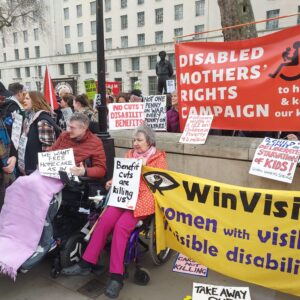On July 12, less than a year after the US Supreme Court repealed Roe v Wade and Casey vs Planned Parenthood, removing the guaranteed right to abortion on a national level, a court in Britain sentenced a woman to 28 months, including 14 months in prison, for terminating a pregnancy.
Her conviction was under the 1861 Offences Against the Person Act – a law which remained on the statute book when the 1967 Abortion Act was brought in. Under the Act a woman can be jailed for life. The ’67 Act was rightly trumpeted at the time as one of the most pro-choice laws in the world – but it didn’t decriminalise abortion, but rather made it legal in specific circumstances.
Abortion should be treated like any other healthcare procedure, not as a criminal act. Many voices have been raised since the sentence demanding the modernisation of the law and arguing for the full right to bodily autonomy. A*CR fully supports those demands – not the church, not the state, Women should decide our fate.
The TUC, which supports decriminalisation, and some individual trade union leaders, were thankfully quick off the mark to condemn the court’s ruling. According to an article in The Times on 11 June ‘Last summer more than 65 medical, legal and women’s welfare organisations wrote to the Crown Prosecution Service that it was never in the public interest to charge women who ends their own pregnancy. They said “no woman should face investigation or prosecution for ending a pregnancy or experiencing unexpected or unexplained pregnancy loss”’.
Decriminalisation has always been a long term aim for pro-choice campaigners in Britain – but it has also always been easier to galvanise serious opposition to attempts to further restrict our reproductive rights in law than it has been to extend them.
In 2019 the Westminster parliament ducked the opportunity to get rid of the 1861 Act entirely. It decided to repeal the Act as it related to the North of Ireland given that the Stormont Assembly was not sitting and that previously abortion there was only allowed in very, very limited circumstances. This means the situation of many decades was reversed – pregnant people in the Six Counties now more rights than those in Wales, Scotland or England
Diana Johnson, Labour MP for Hull North has been a long term advocate of decriminalisation. In 2018 she introduced a 10 minute rule bill which would have repealed the 1861 Act, which progressed to its second reading but like most private members’ bill ran out of time. Diana Johnson also moved an unsuccessful amendment to the Police, Crime, Sentencing and Courts Bill in July 2021, which again would have decriminalised abortion.
Similar positions were reflected in Labour’s 2019 manifesto under Jeremy Corbyn and proposals have been submitted to ensure that they are also reflected in the next manifesto.
Given such recent attempts to correct the law, the existing Tory government cannot be permitted to dodge responsibility for this atrocious ruling by pointing the finger at some politically neutral judiciary. Given the divisions in his party on the issue, Prime Minister Rishi Sunak will likely want to ignore any tricky confrontation on women’s bodily autonomy. Nor should the judge be allowed to be perceived as an innocent in the ruling, after eschewing his powers of discretion and acting as a legal technician for an (1861!) piece of regressive legislation.
In covering this week’s story, the media in Britain seem to have given the anti-abortion lobby more airtime than in living memory. Emboldened by their successes in the United States, these reactionary voices have become more strident. An anti-abortion activist speaking – perhaps shrieking is more appropriate – on Radio 4’s Woman’s Hour on 13 June claimed that majority opinion in Britain opposed late term abortions, something we have been unable to evidence, and which certainly contradicts the data here.
Looking on social media at posts about the case, the antiabortionists are out in force calling those of us who support a woman’s right to choose ‘murderers’ We knew they had become bolder hassling women outside health facilities that provide abortion for those who need and want it, emulating tactics long used in the USA, but this seems a new area for them to be active in. The pro-choice movement needs to step up our campaigning at this level too.
And every trade union branch, every women’s group, every political party which claims to support women need to be mobilising around this question in greater numbers than ever before
Tragedy?
On the other side some of the media have focused on the tragedy of this individual case. It seems clear that any woman facing an unplanned and unwanted pregnancy, or one about which she was ambivalent during the early days of the Covid pandemic, would have had additional pressures than usual.
Doctors’ surgeries were generally closed and many people were afraid to attend even scheduled hospital appointments because transmission routes were unclear. Parents and particularly women had additional burdens with childcare as schools and nurseries closed. Socialising in person, whether with workmates, neighbours or anyone was seriously curtailed adding to people’s isolation.
We understand that this particular woman had moved back in with her estranged partner – when she was pregnant by someone else. We know that violence against women rose significantly during the pandemic – we have no idea whether this was the case in this instance but it – or the fear of it – cannot be ruled out.
Questions were raised about whether the defendant was fit to plead at an earlier stage in the case. It certainly seemed politically and humanely outrageous – as well as legally questionable – that the judge included as relevant the fact that she had plead not guilty to an earlier charge of ‘child destruction’.
But while we express solidarity and support for the woman who has been criminalised, for the three children who have lost their primary carer under this barbaric law and cruel judgement, this case is only an exception because it is an extreme example.
There are many circumstances where women need late terminations – and behind each of them there are dreadful stories of lack of access to information, to services, or to dramatic changes in personal circumstances. No one chooses a late abortion, which is a much more complex procedure than an early termination – no one with real choice chooses to continue an unwanted pregnancy for an extra moment. But in the end, we continue to demand, against all obfuscation, ‘our bodies, our lives, our right to decide’.
“Time To Act” on Eventbrite!
Date: Sat, Jun 17 • 13:00 BST
Location: Strand, London, WC2A 2LL
https://www.eventbrite.co.uk/e/time-to-act-tickets-646932551677?aff=eand
Art (52) Book Review (121) Books (114) Capitalism (65) China (79) Climate Emergency (97) Conservative Government (90) Conservative Party (45) COVID-19 (44) Economics (39) EcoSocialism (55) Elections (82) Europe (44) Fascism (56) Film (49) Film Review (68) France (69) Gaza (59) Imperialism (97) Israel (119) Italy (45) Keir Starmer (52) Labour Party (110) Long Read (42) Marxism (47) Palestine (163) pandemic (78) Protest (149) Russia (334) Solidarity (133) Statement (48) Trade Unionism (134) Ukraine (339) United States of America (130) War (362)
Latest Articles
- Turkey and the Neofascist ContagionThe ongoing battle in Turkey has become increasingly significant for the entire world. If the Turkish popular movement wins, its victory will have a significant impact in galvanizing resistance to the rise of neofascism worldwide argues Gilbert Achcar
- The boys are not alrightSimon Pearson points out that a Minister for Men cannot rebuild the infrastructures of solidarity that were torn apart by decades of neoliberal consensus.
- Yemen on the brinkNow that Trump has returned to the White House with far greater arrogance than during his first term, the possibility of re-escalating the war in Yemen with direct US involvement has become very real, argues Gilbert Achcar
- Labour austerity – balancing the books on the backs of the poorestDave Kellaway on Labour attacks on disabled people
- Turkey: a mass movement builds against Erdogan’s power grabUraz Aydin answers questions from Antoine Larrache about the mobilization currently building in Turkey after the arrest of the mayor of Istanbul, who is seen as Erdogan’s main rival in the race for the next presidential election.






